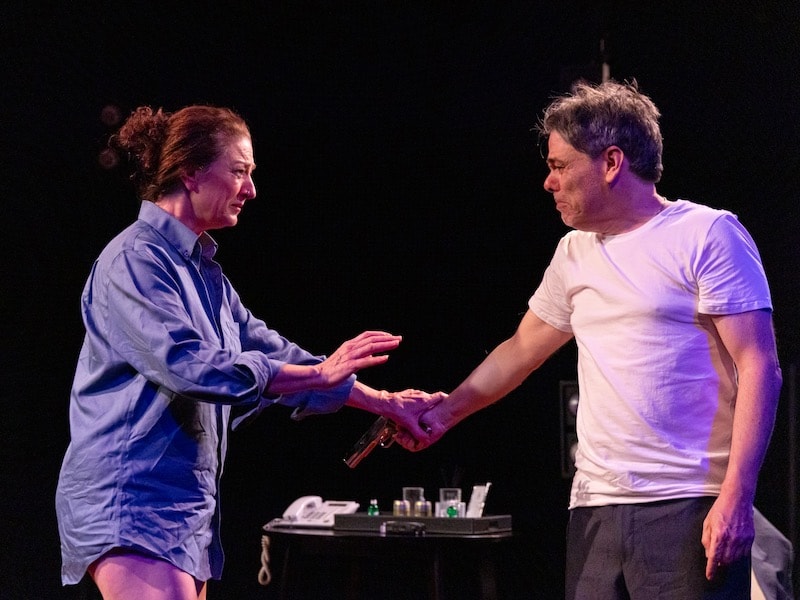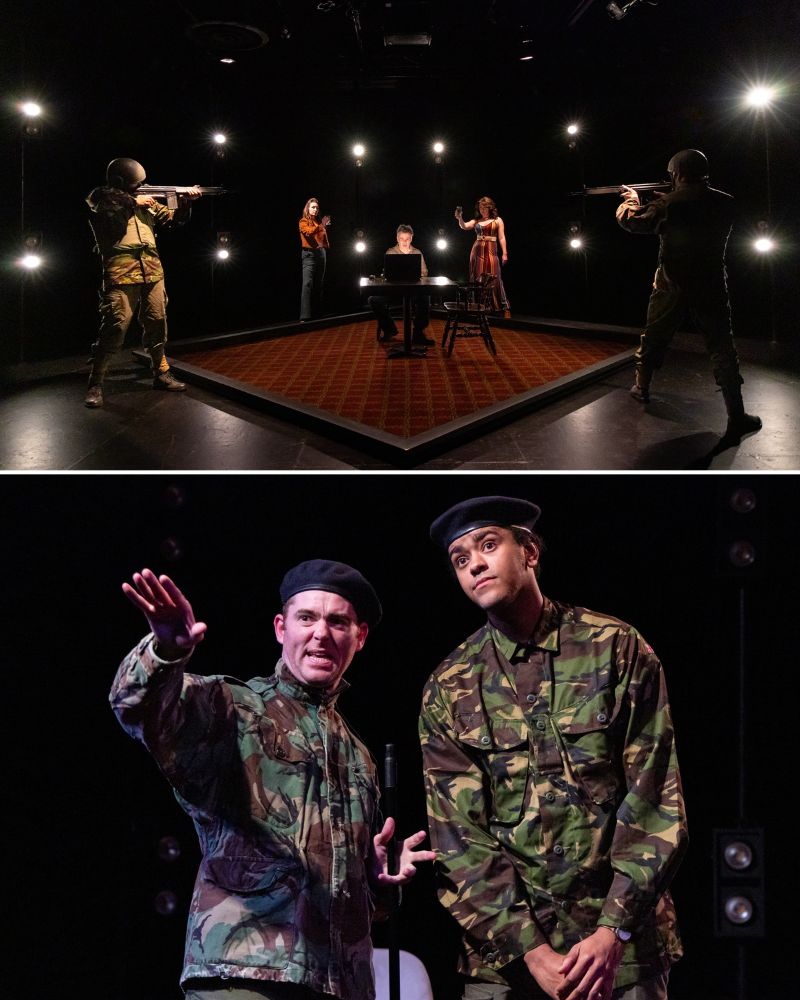When peace comes, the world around you can sigh for relief — no more gruesome news from where you live, they think, everyone can finally get on with their lives.
As if.
Although it can be a relief that you no longer have to check for bombs or snipers, although your house may not be torched to the ground for now, the peace can also have a lingering curse to it. Unfinished business, scores that you know can never be settled. People pass you in the supermarket — you know what they did, but you have been told to let it go.
As if.
In the midst of celebrations for the 25th anniversary of the Good Friday Agreement, which brought an official end to the decades-long conflict known as “the Troubles” in Northern Ireland, Solas Nua has stepped out from all the congratulatory fluff to remind us that peace is never simple. Their world premiere of young Belfast playwright Leo McGann’s taut thriller, The Honey Trap, reminds us that for many who were directly involved in that conflict, the wounds will never heal.

The play was inspired by an oral history project initiated through Boston College involving interviews with survivors — and perpetrators — of the crimes of those days. In lieu of a Truth and Reconciliation Commission (which was convened in post-Apartheid South Africa), the interviews were intended to provide some sense of closure, some opportunity for people on all sides to have their say. McGann, through this play, points out how such efforts, no matter their intentions, might have the opposite effect to what was intended.
When the lights first come up we see a perky young American grad student interviewing a retired British officer who served in Belfast during the Troubles. The contrast in their backgrounds, their view of life, and their opinion on her project, could not be more different. The student’s questions at first are rote, and bland, as her interviewee grows increasingly impatient and angry.
Rebecca Ballinger is spot-on as Emily, the well-intentioned researcher who has no clue how dark and complex her subject truly is. Her biases, once revealed, only make things worse. Seated across the table, and speaking bluntly into her digital recorder, is Jonathan Holmes in the finely-hewn character of Old Dave. Dave has been asked, decades after the fact, to talk about a fateful night in a pub with one of his soldiers — a night that ended in tragedy. Holmes carries this play on his back like the heavily laden soldier’s kit that it is, and he makes Dave’s journey back into darkness as thrilling as it is disturbing.
It only becomes clear later on that Dave hasn’t come for the interview; he has come to gain access to Emily’s recordings. And once he has them, the true journey of McGann’s play begins.
The action jumps back and forth between today and that night at the pub, with Jared N. Graham playing the hyper-macho Young Dave, the sort of braggart officer whose dares always get him and his mates in a heap of trouble. On this night, Young Dave and Bobby (the charming Jordan Essex) have come to what they think is a friendly Protestant establishment, with the goal of hooking up with a couple local girls. The fact that they’re both married doesn’t faze Dave in the least (well, at first, it doesn’t).
By sheer coincidence who should Dave and Bobby set eyes on but two young women who happen to be right across the dance floor eyeing them back. Emily Erickson and Mallorie Stern turn the soldiers’ heads as two young women who say their names are Lisa and Kirsty. Their light chatter and strategic flirtation will lead Bobby to his fate by the end of the evening. Sound designer Jimmy Garver provides a classic early ’70s soundtrack, and the couples pair off with remarkable speed — a bit too quick and easy, it turns out.
What McGann does skillfully throughout the play is to flash back and forth, so that the full extent of the tragedy, and the full responsibility for it, remain unclear until the very last syllable is uttered. What we get along the way is a glimpse of Dave’s desperate attempt to take revenge for Bobby’s murder. But even as he pursues his revenge it becomes clear that he himself has a lot to answer for, and he knows it.

The second act finds Dave in today’s downtown Belfast chatting up Sonia, the owner of a coffee shop down the street from his hotel. McGann has a gift for the kind of worldly courtship-by-invective you’d expect from an older couple like this; and even though we know why Dave is sipping black coffee and flirting with Sonia, their relationship starts off at first as a breezy sort of fling to make you feel young again. Dave takes his time, and plays his role to the hilt, before revealing the real reason he’s invited Sonia up to his room.
As Sonia, Lise Bruneau provides the perfect foil for Holmes’ David. Bruneau offers up a mother (and soon-to-be grandmother) who has settled into what she hopes is a normal life — one that David is determined to shatter. But behind the façade of a worldly matron, Bruneau’s Sonia still has the spark of her old activist days; and her iron determination to survive on this night is on full, glorious display.
One thing to listen for — because it’s so skillfully done — is the re-creations of interviews with those who lived through the Troubles. They talk about those days, what they did, what happened to them, and about the troubling aftermath of meeting their enemies on the street in what is supposed to be peacetime. McGann has created an overlapping soundscape of paranoia, regret, and frustration that is unforgettable.
Director Matt Torney has taken McGann’s script and made it a brisk, often terrifying ride down a very dark memory lane indeed. And Nadir Bey has created a red-carpeted diamond, the edge pointed directly at us, in which the action unfolds, with a variety of lighting effects created by Alberto Segarra, who manages to turn the space from a hotel room to a bar to a night patrol, with soldiers pacing around the stage, assault rifles drawn.
This past year has been one of authorities breaking their arms patting themselves on the back for the survival of the Good Friday Agreement — now compromised by Brexit, which threatens to plunge the region into darkness all over again. How easily you can go from light to dark; this play is especially for those of us who think we’re on the right side, and that people just need to listen to us for the world to get straightened out. McGann brilliantly punctures our illusions about Northern Ireland, about the Troubles, and, more importantly, about ourselves.
Running Time: Two hours with one Intermission.
The Honey Trap plays through November 19, 2023, presented by Solas Nua performing in Lab Theatre II at the Atlas Performing Arts Center, 1333 H Street NE, Washington, DC. Purchase tickets ($45 for general admission and $10 for students) online. or from the Box Office at (202) 399-7993 x501 or [email protected] from 11 AM–5 PM Monday through Friday, or two hours prior to a performance.
COVID Safety: Masking is optional an Solas Nua offers masks for patrons who wish to use them during the performance.
The Honey Trap (world premiere)
By Leo McGann
Directed by Matt Torney
in association with the Kennedy Center’s Michael Kanin Playwriting Awards Program
FEATURING
Jonathan Holmes (Old Dave), Rebecca Ballinger (Emily), Jordan Essex (Bobby), Jared H. Graham (Young Dave), Emily Erickson (Lisa), Mallorie Stern (Kirsty), and Lise Bruneau (Sonia)
CREATIVE TEAM
Matt Torney (director), Nadir Bey (scenic design), Alberto Segarra (lighting design), James Garver (sound design), Heather Lockard (costume design), Katherine Offutt (props), Adrien-Alice Hansel (dramaturg), Rex Daugherty (producer/movement director), Charlotte La Nasa (assistant producer/community engagement)
SEE ALSO:
Solas Nua to stage new script by KenCen playwrighting honoree Leo McGann (news story, September 17, 2023)





Wonderful review. Immensely readable, providing context and texture without giving it all away. I can’t wait to see this!
Thorough review, very well written. My only concern is that too much of the plot is given away; glad I read this after having seen the play. But “spot on” for clearly capturing the dramatic highlights.
As for the play itself, riveting on two levels. As a play it stands on its own as being powerful, poignant, dramatic. The acting is top notch. On a different level it has a personal impact. I was a student in the fall of 1972. Through my university, I had the opportunity to take a “January Study” course, “Society In Conflict”. That January, 1973 I stayed with a family in Creggan Heights, Derry, an area that was a staunchly Nationalist sector that was under essentially martial law, with constant British patrols on the alert. Derry City looked more like a bombed out war zone in 1973 than the colorful, inviting and beautiful city it is today (though there are murals that starkly reveal deep divisions remain to this day). I ended up returning to Derry in the summer of 1974 (staying with Patrick O’Donnell and his family; Patrick was one of the 14 wounded on “Bloody Sunday”) as part of a youth program taking Catholic and Protestant children in Derry, day trips outside the city, for a chance to just be kids. Given what was taking place at the time, we had to alternate days. We would take the Catholic children over the border to Donegal. The following day we would take the Protestant children to coastal towns like Portrush or Portstewart. This experience also gave me a wonderful opportunity to meet community individuals seeking to reach out to both communities impacted by the conflict.
As I said, this play stands on its own merit and is a powerful presentation. For those who experienced the “Troubles” directly from those days, the play captures brilliantly the passions of the times which can have a long reach into the present for those directly involved.
This play will remain with you long after the actors take their well deserved bows.